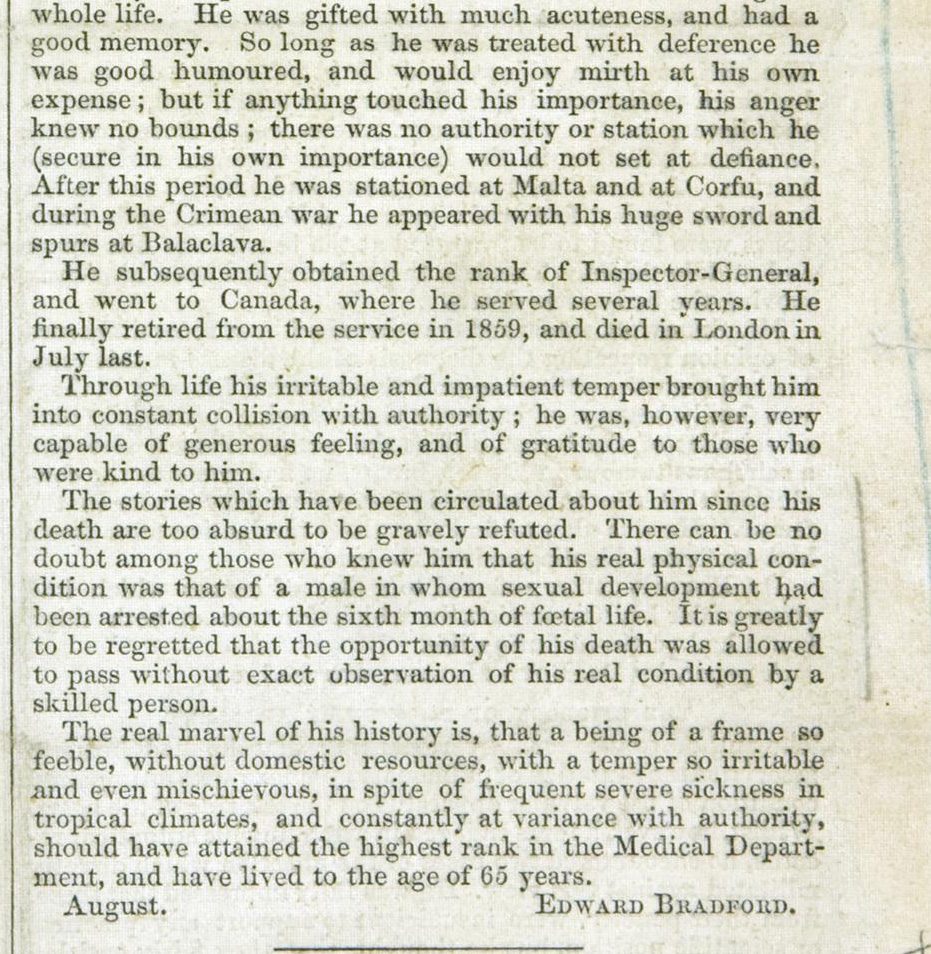
Extract from a letter written by Edward Bradford, Deputy-Inspector-General of Hospitals published under the heading, ‘The Reputed Female Army Surgeon’ in the Medical Times & Gazette, 9 September 1865. Catalogue ref: WO 138/1
Shortly after Dr Barry’s death, his history was reported without respect for his personal life in this publication.
Transcript
…
He was gifted with much acuteness and had a good memory. So long as he was treated with deference he was good humoured and would enjoy mirth at his own expense; but if anything touched his importance, his anger knew no bounds; there was no authority or station which he (secure in his own importance) would not set at defiance. After this period, he was stationed at Malta and Corfu, and during the Crimean war he appeared with his huge sword and spurs at Balaclava.
He subsequently obtained the rank of Inspector-General and went to Canada, where he served for several years. He finally retired from service in 1859 and died in London in July last.
Through life his irritable and impatient temper brought him in constant collision with authority, he was, however, very capable of generous feeling, and of gratitude to those who were kind to him.
The stories which have circulated about him since his death are too absurd to be gravely disputed. There can be no doubt among those who knew him that his real physical condition was that of a male in whom sexual development had been arrested about the sixth month of foetal life. It is greatly to be regretted that the opportunity of his death was allowed to pass without exact observation of his real condition by a skilled person.
The real marvel of his history is, that of being of a frame so feeble, without domestic resources, with a temper so irritable and even mischievous, in spite of frequent severe sickness in tropical climates, and constantly at variance with authority, should have attained the highest rank in the Medical Department, and lived to the age of 65 years.
August. Edward Bradford.
- Why do you think Edward Bradford sent this letter to be published in the Medical Times & Gazette?
- Is Edward Bradford’s action appropriate today?
- Which qualities outlined in this extract infer that Dr Barry was a highly effective doctor?
- Which aspects of his personality reportedly caused him to conflict with authority?
- Do these aspects explain events described in Source 4?
- Can you suggest 4 words to describe Dr Barry’s personality?
- Which pronouns does this extract use to describe Dr Barry?
- Does the extract reveal anything about how James Barry chose to live his life?
- Do you accept Bradford’s conclusion about the ‘real marvel of his (James Barry’s) history’?
- Is Dr James Barry’s significance based on other reasons inferred by the sources?
